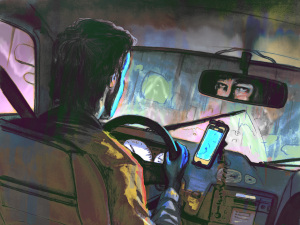
By: Meghan Collins, Web Editor
“Let’s just get an Uber” – party people everywhere.
That phrase is so commonly uttered on Friday and Saturday nights that it is no surprise that ride-sharing services offered by companies, like the San Francisco-based Uber and Lyft, have become increasingly popular with Pennsylvania party-goers. Lyft and Uber operate by connecting drivers in their own vehicles with riders via smartphone apps.[1] However, even though widely-popular with twenty-something’s, Uber and Lyft may not be able to operate in Pennsylvania.
The Public Utility Commission (PUC) and the Philadelphia Parking Authority regulate the traditional taxi services in Pennsylvania. Right now, the commissions do not possess the express authority to monitor ride-sharing services but rather have jurisdiction because they are motor common carriers. Because Uber and Lyft do not fall into the clearly regulated traditional taxi category, they do not have to purchase medallions, they can price surge, and liability falls on the driver’s personal insurance.
The two San Francisco-based ride-sharing companies have been operating in the Pittsburgh area for months even after the Public Utility Commission served cease- and- desist letters with proposed daily fines of $1,000 a day.[2] The Public Utility Commission finally relented and allowed Uber and Lyft to operate in Allegheny County under temporary authority until the PUC decides on their applications for permanent licenses. [3] To operate under the temporary authority, the companies were required to show insurance policies providing primary coverage of drivers and that the policies meet PUC standards.[4]
In mid- September Pennsylvania lawmakers were met in Harrisburg with six ride –sharing proposals awaiting their consideration.[5] One proposed bill would require ride-sharing companies to “maintain detailed records, establish driver training programs, enforce a zero-tolerance policy on drug and alcohol use, conduct background checks and implement driver guidelines.” [6] The bills proposed bear similarity to the bill that Colorado Governor John Hickenlooper signed into law in June. [7]
After much deliberation, legislators announced that no new laws are likely to be passed this year that would permit ride-sharing companies to operate in Pennsylvania despite rallies by ride-sharing supporters and taxi parades in Philadelphia.[8] Furthermore, in late September the Public Utility Commission Administrative Law Judges recommended that Uber should not be given permanent authority to operate in Pennsylvania, however, the Commission will decide sometime in November whether or not to accept, deny, or modify the judges’ original determination. [9]
The PUC Administrative Law Judges factored Uber’s defiance of cease-and-desist letters into their recommendation against permanent authority. [10]
“The applicant clearly has not informed itself of the regulatory requirements of the commonwealth, and also is not committed to playing its part in ensuring that the transportation service that it offers is safe and accommodates the public,” wrote the judges.[11]
In response to the judges opinions, Taylor Bennett, a spokesman for Uber, said the judges’ recommendation “completely reinforces the critical need for state legislation that embraces innovation and gives all Pennsylvanians more choice to safe rides.”[12]
Matthew Gore, former manager of Uber’s Pittsburgh operations said when asked why Uber was operating in defiance of cease-and-desist orders “just because a business model is not addressed by current regulations, just because it’s outside the scope of current regulations, doesn’t make it unlawful.”[13]
Pennsylvania is not the only state challenging ride-sharing companies, other jurisdictions that have seen legislation regarding ridesharing since 2013 are Arizona, California, Florida, Georgia, Illinois, Maryland, New Jersey, Oklahoma, Rhode Island, Virginia, and Washington, and District of Columbia.[14]
Right now, Uber and Lyft are still operating in Pittsburgh under temporary authority, but until state legislators draft a bill their fate will lie with the Public Utility Commission and the Philadelphia Parking Authority.
[1] http://www.post-gazette.com/business/2014/09/14/Ride-share-companies-may-get-boost-in-Harrisburg/stories/201409140060
[2] Id.
[3] Id.
[4] http://www.post-gazette.com/business/2014/08/18/Uber-Pennsylvania-PUC-hearing/stories/201408180147
[5] http://www.post-gazette.com/business/2014/09/14/Ride-share-companies-may-get-boost-in-Harrisburg/stories/201409140060
[6] Id.
[7] Id.
[8] http://articles.philly.com/2014-10-11/business/54873722_1_uber-and-lyft-puc-spokeswoman-jennifer-kocher-pennsylvania-public-utility-commission
[9] http://articles.philly.com/2014-09-27/business/54357125_1_uber-and-lyft-ride-sharing-company-transportation-network-companies
[10] Id.
[11] Id.
[12] Id.
[13] http://www.post-gazette.com/business/2014/08/18/Uber-Pennsylvania-PUC-hearing/stories/201408180147
[14] http://www.movemag.org/policy-and-advocacy/225-taxis-at-your-fingertips.html
